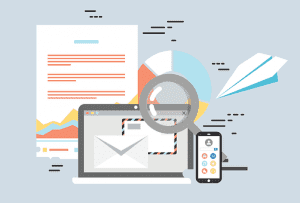
The number of unwanted solicitations we all receive via the email inbox — despite ever-improving spam filters — is such a waste of time. According to Pingdom, there are some 2.2 billion email users and 144 billion emails sent per day. According to Symantec, 69% of that email is spam. {Click to Tweet!} All the same, email marketing is still an efficient, if not effective, way to drive business and/or traffic to a site. Notwithstanding the true garbage spam, there are several other classes of email pollution. For example, you receive (1) terribly impersonal mails to which you might have voluntarily subscribed and (2) unsolicited mail that is to some degree nominative, but does nothing to inspire confidence. Neither of these types of mails is personal or valuable.
Anonymity = lack of confidence
While anonymity is a key underpinning of democracy, in terms of non-verifiable or anonymous emails in one’s inbox, anonymity is a plague and undesirable (unless, perhaps, we’re talking wikileaks material). I have noticed that there is a code in the way these misleading emails are addressed to you.

Dear Minter,
We have seen your webiste [sic](www.thewww.minterdial.com) and think that you might appreciate our product and like you to write about it. Please do check out our site www.xxx.com.
Looking forward to hearing back from you.
Signed, Jim Noya
“Jim Noya”, who typically has a rather colloquial tone, inevitably has an email address along the lines of jimnoya92@gmail.com. Unfortunately, Jim does not add any signature or link and has no intention to reveal his true identity. I imagine that there are a few well-meaning types who have not figured out the “codes,” and send out legitimate mails without a link because a link could be construed as noxious; but, for the rest, it is a truly regrettable waste of time and space.
Being transparent about who you are
If total transparency is a non-starter, being significantly transparent about who you are is certainly a way to help garner trust. In an era where anonymity is relatively easy to set up (using proxy servers, masked IP, etc.), marketers must redouble their efforts to gain the confidence of the recipients, whose anti-spam trigger is getting shorter and faster.
Next generation of email marketing
Even if email marketing remains a powerful tool, I still think people who are serious about the long-term health of their email campaigns should start to look at the next generation of needs. I dream one day that my inbox will be seamlessly vetted by my network. That is to say, I could choose to receive mail only from senders who know or have connected with one or other people in my network. I call this socially connected email filtering. {Click to Tweet!}
The value of a personal network
The consequences of socially connected email filtering  functionality were to exist, brands will be hard pressed to retroactively get “friendly.” Thus, it will be important to start earlier, in anticipation, to build up and develop your social media connections.
functionality were to exist, brands will be hard pressed to retroactively get “friendly.” Thus, it will be important to start earlier, in anticipation, to build up and develop your social media connections.
What are your thoughts? Do you think socially connected email filtering is likely and/or desirable?











We also have a new, old governor who was against proposition 13 which sets a
maximum cap on property taxes and will likely propose new massive state taxes to deal
with a $25. The State Office of Real Estate Appraisers has a
standard log form used to keep track of your hours and it can be downloaded from their site at this link:.
The creatures fed on Bill’s agony and mind-numbing terror.
We also have a new, old governor who was against proposition 13 which sets a
maximum cap on property taxes and will likely propose new massive state taxes to deal
with a $25. The State Office of Real Estate Appraisers has a
standard log form used to keep track of your hours and it can be downloaded from their site at this link:.
The creatures fed on Bill’s agony and mind-numbing terror.